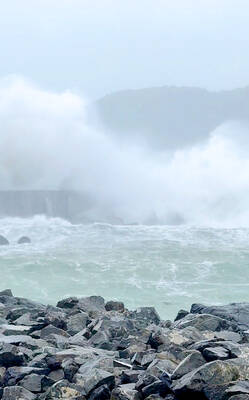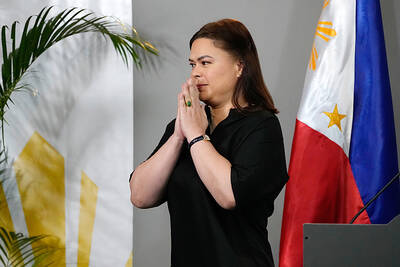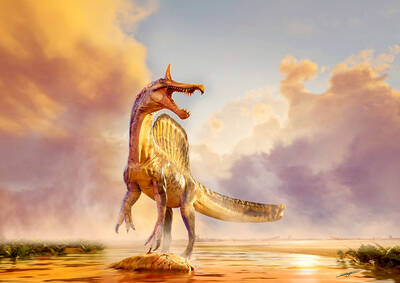Polish presidential candidates offered different visions of Poland and its relations with Ukraine in a televised debate ahead of next week’s run-off, which remains on a knife-edge.
During a head-to-head debate lasting two hours, centrist Warsaw Mayor Rafal Trzaskowski, from Polish Prime Minister Donald Tusk’s governing pro-European coalition, faced the Eurosceptic historian Karol Nawrocki, backed by the right-wing populist Law and Justice party (PiS).
The two candidates, who qualified for the second round after coming in the top two places in the first vote on Sunday last week, clashed over Poland’s relations with Ukraine, EU policy and the track records of their respective parties, which have dominated Polish politics since 2005.

Photo: Reuters
Nawrocki — a conservative historian, who it was revealed this week had been involved in organized fights between groups of soccer hooligans in his youth — characterized the election as a referendum on an unpopular coalition government led by Tusk, repeatedly dismissing his rival as “Tusk’s deputy.”
The government came to power in late 2023, promising to undo illiberal reforms by their right-wing predecessors and liberalize laws on abortion and LGBTQ rights, but has made little progress, fearing a veto from outgoing conservative Polish President Andrzej Duda.
The issue has loomed over the presidential election, turning the ballot into a question of whether voters want to carry through with the political overhaul or prefer an opposition president to keep the government in check — even at the cost of political paralysis.
Trzaskowski challenged Nawrocki’s attempts to paint himself as an independent candidate despite being supported by PiS, which ruled Poland between 2015 and 2023.
“You say you’re not from PiS, but people from PiS pay for your campaign, organize it and lead it ... There is an English saying: if it looks like a duck and quacks like a duck, it’s a duck,” he said.
During tense exchanges on Friday night, both candidates agreed on the need to support Ukraine militarily in its fight against Russia.
However, they clashed over other elements of the relationship, including Ukraine’s future NATO membership and the controversy over the import of cheaper agricultural goods, which has led to anti-Ukrainian protests by Polish farmers.
Courting the far-right voters of two candidates who came third and fourth, Nawrocki already said this week that he would block Ukraine’s accession to NATO.
On Friday, he repeated his criticism of the farming arrangements.
“As a president, I will do everything to really support [Ukraine] militarily,” but would not let Poland become a secondary market for Ukrainian goods, he said.
Trzaskowski, a former EU lawmaker and former secretary of state in the Polish Ministry of Foreign Affairs, attacked him for “speaking the language that favors [Russian President Vladimir] Putin,” citing his rival’s criticism of EU plans to bolster member states’ militaries.
“We need to be tough with Ukrainians, protect Polish interests ... but help Ukraine, because Putin has to break all his teeth in Ukraine and not attack anyone else,” Trzaskowski said.
With just a week to go until the vote, the candidates remained virtually level, with individual polls showing narrow leads both ways within the margin of error.
Experts have said that voter mobilization — with turnout already at a record high in the first round — could play a decisive role in deciding the outcome.
Today, both candidates are to lead rival marches across Warsaw, symbolically starting simultaneously on parallel streets, but going in opposite directions.
The Polish presidential election run-off is to be held on June 1.

Heavy rain and strong winds yesterday disrupted flights, trains and ferries, forcing the closure of roads across large parts of New Zealand’s North Island, while snapping power links to tens of thousands. Domestic media reported a few flights had resumed operating by afternoon from the airport in Wellington, the capital, although cancelations were still widespread after airport authorities said most morning flights were disrupted. Air New Zealand said it hoped to resume services when conditions ease later yesterday, after it paused operations at Wellington, Napier and Palmerston North airports. Online images showed flooded semi-rural neighborhoods, inundated homes, trees fallen on vehicles and collapsed

‘COST OF DEFECTION’: Duterte’s announcement could be an effort to keep allies in line with the promise of a return to power amid political uncertainty, an analyst said Philippine Vice President Sara Duterte yesterday announced she would run for president of the Southeast Asian nation of 116 million in 2028. Duterte, who is embroiled in a bitter feud with Philippine President Ferdinand Marcos Jr, was impeached last year only to see the country’s Supreme Court throw the case out over procedural issues. Her announcement comes just days before her father, former Philippine president Rodrigo Duterte, begins a pretrial hearing at the International Criminal Court (ICC) in the Netherlands over crimes against humanity allegedly committed as part of a brutal crackdown on drugs. “I offer my life, my strength and my future

FEROCIOUS FISH-EATER Scientists have found a new species of dinosaur from the Cretaceous Period, a ‘hell heron’ that stalked the rivers, deep in the Saharan desert At a remote Sahara desert site in Niger, scientists have unearthed fossils of a new species of Spinosaurus, among the biggest of the meat-eating dinosaurs, notable for its large blade-shaped head crest and jaws bearing interlocking teeth for snaring fish. It prowled a forested inland environment and strode into rivers to catch sizable fish like a modern-day wading bird — a “hell heron,” as one of the researchers put it, considering it was about 12 meters long and weighed 5-7 tons. The dinosaur presented a striking profile on the Cretaceous Period landscape of Africa some 95 million years ago as it hunted

NOT YET THERE: While the show was impressive, it failed to demonstrate their ability to move in unstructured environments, such as a factory floor, an expert said Dancing humanoid robots on Monday took center stage during the annual China Media Group’s Spring Festival Gala, China’s most-watched official television broadcast. They lunged and backflipped (landing on their knees), they spun around and jumped. Not one fell over. The display was impressive, but if robots can now dance and perform martial arts, what else can they do? Experts have mixed opinions, with some saying the robots had limitations and that the display should be viewed through a lens of state propaganda. Developed by several Chinese robotics firms, the robots performed a range of intricate stunts, including martial arts, comedy sketches and choreographed